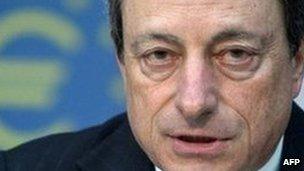Mario Draghi defends ECB's bond buying plan
- Published

Mario Draghi has sought to allay concerns over the ECB's bond-buying programme
Mario Draghi, the head of the European Central Bank (ECB), has defended its bond-buying programme.
The plan, dubbed Outright Monetary Transactions (OMTs), allows the ECB to buy bonds of eurozone member countries to bring down their borrowing costs.
Its announcement last year helped lower borrowing costs for debt-burdened countries such as Spain and Italy.
But critics have argued that it eases the pressure on debt-laden countries to reform.
Germany's central bank has also voiced its concerns against the programme and there is a court hearing against it in Germany later this month.
However, Mr Draghi sought to allay any fears, saying that the ECB can only start buying bonds of a country after it had requested a bailout and as a result agreed to reforms.
"They can either reform without OMTs and retain economic sovereignty or they can reform with OMTs but give up some of their economic sovereignty," Mr Draghi was quoted as saying in a speech in Shanghai by the Associated Press news agency.
"Either way, they have to persevere in their reform efforts."
The ECB chief added that the OMTs were "designed to keep government bond yields just below 'panic' levels" and "not to bring them down to levels that would somehow help government solvency".
Mr Draghi said that the scheme had played a key role in calming the financial markets and "virtually all economic agents, including corporations, banks and households" were benefiting from that.
- Published31 May 2013
- Published6 September 2012
- Published6 September 2012